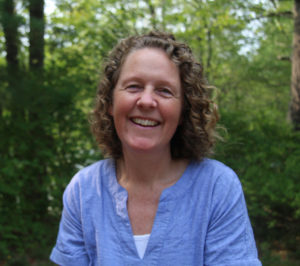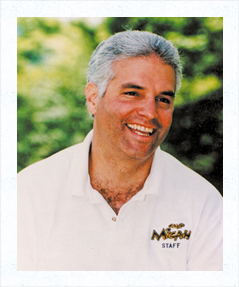Camps’ Top Priority: Keeping Kids Physically and Emotionally Safe
State laws, licensing standards help ensure youth camps protect campers and staff alike
Kirstie Truluck, director of girls’ Camp Wavus in Jefferson, says her best counselors demonstrate precisely what camps need: “how to model healthy boundaries while maintaining a connection” to their campers. Both elements are essential, she says, because they are in the best interests of staff and kids alike.
“It’s subtle and simple advice. The kid should be setting the tone,” she says.
Such protocols are common at Maine camps.

camps conduct each summer prior to the arrival of youngsters. With licensing requirements promulgated by the Department of Health and Human Services, plus the designation as mandated reporters of camp personnel over the age of 17, camps have a lot of ground to cover as they ensure campers have the best, safest, experience possible.
Truluck says the camp’s mitigation and management of risk takes many forms as it complies with Maine state requirements. For example, from evaluating the temperature of water from faucets, to examining instructor certificates, to assessing infirmary practices, state officials scrutinize operations, Truluck says. Camps like Camp Wavus carry out extensive background checks of applicants, closely check references, and work closely with their insurers to make sure staff driving records are clean.
As for staff training, Truluck says there are two goals: “increase capacity, decrease exposure.” The capacity element is broad, she says, ranging from teaching medical protocols and carrying out rescue scenarios, to learning about age groups’ developmental stages, to team building and peer engagement.
“I intentionally have spent years finding all the different ways to train these young women to speak to each other, to share the good and the challenging things,” she says. That includes role playing, to help foster open dialogue.
Risk mitigation is also essential, Truluck acknowledges. Outside trainers teach everything from lifeguarding to first aid to abuse prevention and mandatory reporting requirements. Truluck says personnel from Sexual Assault Support Services of Midcoast Maine engage staff in conversations about boundaries and offer a series of scenarios. As mandated reporters, all Maine camp counselors and staff over age 17 are obligated by state law to inform camp leadership and the state if a camper discloses information about abuse. The state offers training for this responsibility through both an online program, or free in- person training.
Truluck says she addresses another element of ensuring camper safety by inviting personnel from the local sheriff’s department to walk the camp property and familiarize themselves with the full facility.
Safety and compliance are crucial, Truluck says. So too is the “balancing act of building deep and lasting connections with maintaining boundaries.”
At Camp Micah, in Bridgton, owner and director Mark Lipof describes a multi-faceted approach to camper safety. Like Truluck, Lipof says a well-trained staff is vital. “They are the security for camp. All know who should be in camp and who shouldn’t,” he says. “It’s every staff members’ job to address it.”
Staff hiring practices are stringent, Lipof says, calling background checks “crucial.” He says two assistant directors do the “leg work” of checking references, and in interviews “make sure [applicants are] correct for our setting.”

Once at camp, staff members learn all relevant legal issues, Lipof says. That means understanding never to be alone with a camper and “not to put yourself in a situation where you can be accused.”
“It’s a sad world we live in. Training the staff is crucial,” he says. Demands on camps to ensure policies are in place and carried out are greater than ever.
As a Jewish camp, Camp Micah must also address safety concerns regarding anti-Semitism, Lipof says. Citing a 57 percent national increase in anti-Semitic crimes last year, he says the camp will have a 24/7 security presence this summer. The camp property is also secured with a locked gate.
With any safety concern, Lipof says the real question is “what are you doing as a camp to make sure [campers] are physically and emotionally safe all summer?” Attending to those measures will help ensure that kids grow and learn, he says. Camp Micah is also accredited by the American Camp Association, a national organization with prescribed standards for operations and regular visitation assessments.
Like Truluck, Lipof advocates for “open communication,” both between staff and kids and administration and kids. “You have other people’s children. There’s an assumption of safety first.”
Terri Mulks, director of Camp Susan Curtis, an ACA-accredited camp in Stoneham, guides a population of youngsters for whom home environments are often challenging. “Our entire staff training is based on keeping campers safe and helping them feel safe while at camp,” Mulks says. “They are coming from environments where that’s not a first priority.”
As a result, Mulks says thorough training is particularly important. An element of that is helping staff navigate conversations. “Sometimes kids talk privately. We cannot have private conversations with kids.”
Mulks says one approach is to facilitate “non-private private conversations,” where staff members first inform supervisors and then speak with campers “alone in front of everyone.” Porches and picnic tables permit campers to share concerns with staff members and allow staff to protect themselves, Mulks says. “It’s so important to make connections,” but a staff member is never permitted to be alone with a camper.
Mulks says staff members undergo a 13-hour day of behavior management training in the latter part of training week. The key focus is intended to answer the question of “what is everything we can do to make sure kids are safe, and staff, too?” Campers often make disclosures, she says, increasing the importance of mandated reporter training. Staff members are also guided in active listening skills. This helps them glean essential information and avoid having to return to the camper for additional details about their situation.

“Last summer I said this was a year where both our campers and our families seemed higher needs and lower functioning,” Mulks says. More youngsters are living with relatives, she says, and “the foster system is overtaxed.” Accordingly, the stability of the camp experience is increasingly valuable. And the behavior management training “goes with the flow of whatever’s happening in the world.” The impact of kinship placements, the opioid crisis, incarceration, and mental illness in the home are all significant, she says.
“One of the things about my job, I have to be ready for anything,” Mulks says. “I surround myself with very good people.”
Day camps must also comply with state licensing requirements and mandatory reporter obligations. Liz Tully is director of operations at Camp Ketcha in Scarborough. Camp Ketcha is ACA-accredited and trains a staff of about 90 before the summer season begins. Like many residential camps, Camp Ketcha staff members often come through the ranks as campers and leadership training participants, so they are familiar with the camp and its mission. But universally, Maine camps such as those profiled here undertake extensive training efforts. Camp Ketcha is no exception, ensuring State of Maine, ACA, legal, and insurance compliance.
Tully says that by consulting with their insurance provider, and learning what other camps have dealt with, they can address potential problems before they happen. Other factors are helpful as well, she says. Low camper-staff ratios maximize safety, as does the role of head counselors, who circulate around camp to observe activities and interactions. Like other camps, Camp Ketcha prohibits one-on-one camper-counselor contact. It also requires mandated reporting training, even for those staff under age 18, who are not legally bound as mandated reporters.
Training policies have shifted in recent years, Tully says. Information regarding youth and staff mental health has become more extensive, for example.
“ACA keeps us on top of industry standards,” she says. Tully is also an ACA accreditation visitor, which she says has provided valuable information from other camps’ programs.
Communication with parents is also a top priority, Tully says. Email or phone calls enable reporting “minor injuries, camper issues, behavior things,“ Tully says. “We also tend to over-communicate with families.”

In addition, Tully says the camp is “very transparent” about activities. Parents can visit during the day; some have lunch with their kids. In addition, the camp has modified its after care staffing so that the same staff members fill that role all summer. This enables counselors to chat with after care staff about issues that may have taken place during the day. After care staff can then communicate with parents or caregivers at pick-up.
Camps across the state are registering campers and hiring staff for the summer season. With youth safety, health, growth and development in mind, these camps pay close attention to the full spectrum of rules and regulations that govern their operations. Equally important, camp administrators are continually mindful of the physical and emotional needs of the staff and kids they serve. Safety. Friendship. Fun. The goals are clear. So is the commitment to achieve them.